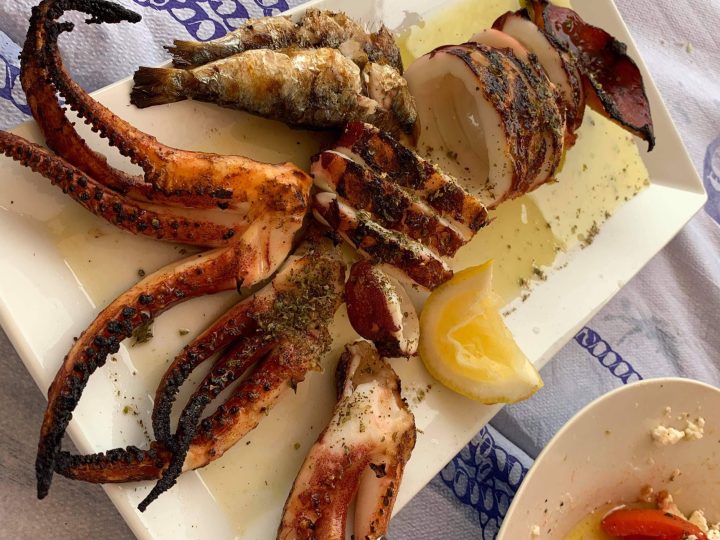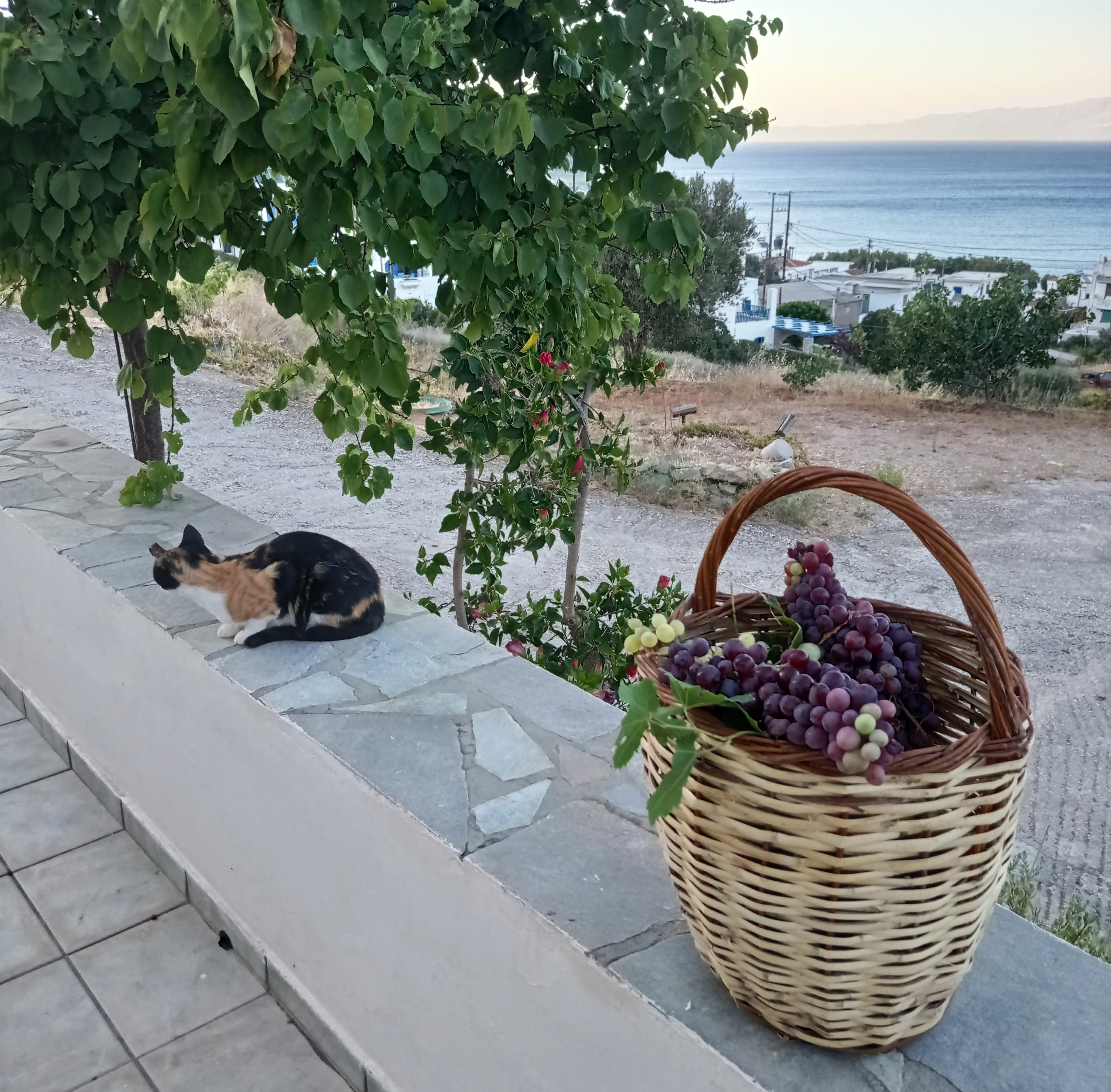EATING THE AEGEAN
Aphrodite and I, lemon lipped in Kythira

Introducing a new regular column from Greece by Nia Magoulianiti-McGregor, who finds herself spending more time there than expected.
I was out on my ear on the streets of Kythira, a Greek Ionian island, in peak season. This very unexpected turn in my living arrangements was caused by a most pedestrian if obsessive compulsive event: toothpaste (mine) spilled on the outskirts of a basin (his).
“I didn’t know it was toothpaste,” my former friend said later during an attempted rapprochement explaining his outraged overreaction and my equally outraged exit from his mountain-top villa. “I thought maybe you’d squeezed lemon onto the marble – it would have been ruined!”
Well, yes, Greeks squeeze lemon on many things – I’ve personally squeezed it on chicken, lamb, and lentils but never once on a basin, marble or otherwise, so that former friendship remains down the drain.
With Greece’s tourism strongly rebounding seemingly at the very same moment I engaged in the Herculean task of finding alternative accommodation, my old friend, amateur foodie, sailor and regular Kythira visitor, Mihali Karamanof, heroically saved the day by sailing into port on his catamaran Tortue de Mer. His had been a two-month voyage crossing the Atlantic and Mediterranean from the Caribbean.
It was an entrance worthy of Odysseus arriving on Ithaca – another Ionian island – in the nick of time to offer me a cabin and tuna risotto for dinner. (“Self-caught in the Ionian Sea off Sicily weighing 30-plus kilograms.”)
Though his was a mini-journey compared to Odysseus’ 10-year struggle, nevertheless, Mihali had also fought storms, languished in ports (due to Covid lockdowns though, not a Cyclops invasion) and battled other stiff challenges including dangerously low diesel and then beer levels, before reaching shore.
And unlike Odysseus arriving in a murderous rage at pretenders to his throne, Mihali had instead come wondrously inspired by the “richness of the food” along his travels.
“There were new tastes, new dishes, and new interpretations of similar themes.”
In Dominica, he discovered something “completely new”, he says: grilled Lion Fish, an invasive and venomous sea monster from the Red Sea – “slightly gamey with crayfish-like firmness” – being cunningly eradicated by the locals by catching, cooking and consuming them. In the Caribbean, he found “mac and cheese” a bona fide side dish, a “worthy substitute for French fries”, and he feasted on Creole cuisine – meat or chicken bursting with ginger, chilli, turmeric, lime and mango, hosing it all down with a Planteur cocktail full of white rum and guava juice.

Sardines are manna from heaven in Porto, Portugal. (Photo: Mihali Karamanof)
“In Porto in Portugal a simple plate of sardines and boiled potatoes tasted like manna. In Spain there was an orgy of tapas with grilled red peppers, fried green peppers and flavourful cold meats like jamon or chorizo.”
“An orgy?”
“Remember, Nia, you once said you read that food is the sex of the sixtysomethings.”
“Oh.” A mixed blessing.
Still, comfort eating is always welcome and that night on slightly giddy waters thanks to the Meltemi winds that blow in summer, the tuna, preserved in glass with seawater after being sterilised in a pressure cooker at a high temperature, was almost ready to be served.
“Coat the rice with olive oil and butter, deglaze with white wine, add the tuna with its ready-made stock (the seawater) and let it all absorb for two minutes. That’s it.”

Vana’s stuffed calamari stew. (Photo: Vana Argyris)
Still inspired by the sirens of seafood recipes, dinner on board the next evening was a calamari stew. Slowly fry an onion in olive oil, toss in whole peppercorns, a few bay leaves “for bitterness and tanginess”, a cinnamon stick, red wine – “lots” – fresh tomatoes, a drop of sherry for sweetness (“preferably from Jerez in Spain”) and then mix in the calamari. “Don’t remove the ink,” instructs Mihali. “It makes the dish richer.” Cool and rewarm.
Delicious but I couldn’t linger there forever having discovered all too recently that friendships at close quarters can be skittish beasts, so I abandoned ship and made for land.
Accommodation expenses in high season meant an attempt at thrift.
No, not on wine, obviously. Until a sympathetic South African introduced me to a drinkable “vintage”, called To Spitiko (meaning homemade). Described on the label of its plastic bottle as a “cool wine for every occasion with aromas of summer fruits”, the occasion was a challenged rand-to-euro exchange rate, and at three euros for 1.5 litres the summer fruits were redolent with the sweet fragrance of frugality.
Now ensconced at Evangelia House Sea View Apartments in Agia Pelagia, it seemed a perfect time to bastardise English celebrity chef Rick Stein’s Greek lamb recipe*. With whole garlic cloves, white wine, chunks of lamb – and yes, a squeeze of lemon, Mihali had prepared me: “This is best eaten less than hot so wait until the flavours settle and penetrate the meat.”
“It’s how Penelope might have waited for Odysseus,” he explained. “The anticipation just adds extra flavour.”
Owner of my accommodation, Greek Australian Vana Argyris, understands. “Kythira is the island of Aphrodite, where the Goddess of Love sailed to shore on a clamshell.” Vana is here thanks to her meddling.
Now 60, she first met Nico at a taverna over 20 years ago. “I was eating a bougatsa (a Greek custard and semolina pie with buttery golden phyllo dusted with icing sugar and cinnamon) but his words were sweeter. “Men don’t speak to you like that in Anglo-Saxon countries – telling you how beautiful you are. You feel like more of a woman here.” She returned to Sydney but Nico remained a simmering memory. She visited Kythera again years later and they were reacquainted. She cooked for him. He played the bouzouki for her. She bought a hotel. It’s complicated.

Gemista: Stuffed tomatoes and eggplant with other veg. (Photo: Vana Argyris)
Vana took pity on my reduced state and, bored with my constant grumbling about exchange rates, began leaving food parcels in multicoloured Tupperware in my fridge. Lentil soup with onion, garlic, a bay leaf and olive oil (yeah, and drizzle with lemon), spanakopita and hortopita (basically any green vegetable or herb other than spinach.) Another day there was papoutsakia – eggplant filled with mince and béchamel sauce – gemista, hollowed out roasted tomatoes and peppers packed with rice, garlic, mint and parsley.
I devoured her millefeuille with a layer of grape jam (her own grapes, her own jam) between the layers of pastry and also halva with preserved orange rind and cinnamon.

Vana holds roast free-range chicken grilled with lemons and olive oil, with garlic and origanum. (Photo: Supplied)
There was also kleftiko with potatoes and leeks – a shoulder of lamb (“more tender than most cuts”) first marinated in local olive oil, oregano, lemons from her tree, a bay leaf, garlic, thyme, salt and pepper. Add an anchovy, she says. “It leaves a salty taste.”
Kleftiko (stolen) harks back to when freedom fighters stole animals from landowners and cooked the meat in ceramic pots on red hot coals in a covered hole in the ground to conceal the smell and smoke.
“Lamb is sacred here, especially at Easter.” And, she says sternly, the preparation of lamb is taken seriously.
“One of my uncles is still on bad terms with another for filling the carcass of the lamb on the spit with potatoes. They banged against the inside of the animal, then they started rolling out into the fire! A sacrilege.”
Still the food keeps arriving in my fridge: Cheese pies and meat pies, a spinach soufflé, Greek salad, moussaka, and roast chicken with lemons, origanum, olive oil and garlic, surrounded by leeks, onions and carrots.
There’s also a souvlaki shop down the road. Owner Dritan Cako arrived as a refugee from Albania 30 years ago. Now he’s part of the food scene here. “If you make something with love, it makes people happy so they forget their pain.”
Of course, there are visits to restaurants when parsimony gets tedious. Greek zucchini fritters at restaurants like Kapari or O Magos in Kapsali in the south. And grilled squid, tomato tart and meatballs at Acrogiali in the north with tables on the beach. And pastichio from Yeusi Elladas (Taste Greece) in Potamos and bougatsa and rusks from the Karavas Bakery begun in 1932 by the present owner’s grandfather.
If food is the new post-60 sex, I’m having a wild time. I meet other sixtysomethings. They’re also wolfing down their fair share. We nod knowingly at each other.
“In the DNA of Greeks is an almost subversive appreciation of life: of food, drink and sex,” says Vana. “And just as sex boils down to a union with another person where you’re giving of yourself, so is eating with them.”
“When we get together on the balcony to break bread, we’re celebrating our love for each other, our joining, our feasting in honour of people far away. If I can’t feed my family, I’m feeding those who have become family. It’s about our humanity.”

Grapes from Vana’s garden. Can be used for jam. Cat’s name is Psipsina. (Photo: Vana Argyris)
There’s also fruit in abundance. After all, Aphrodite started the Trojan War by offering Paris of Troy the gift of Helen, the “most beautiful woman in the world” (unfortunately someone else’s wife) if only Paris would give her a golden apple.
There are pomegranates, known as the love apple, watermelon, figs (also an aphrodisiac and the last meal of another Greek, Cleopatra, before the asp done her in), oranges, prickly pears, grapes and indigenous apple-peaches grown in the village of Mitata so sweet and delicate they’re known as the “breasts of Aphrodite”.
And lemons, of course. And a lesson: If life gives you lemons, just squeeze some on your food. DM/TGIFood
Rick Stein’s recipe includes ‘waxy potatoes’ and the bitter fruits of a net worth that has gone down its own drain due to England’s Covid lockdown.
SUBSCRIBE: There’s much more from Tony Jackman and his food writing colleagues in his weekly TGIFood newsletter, delivered to your inbox every Saturday. Subscribe here. Also visit the TGIFood platform, a repository of all of our food writing.
The writer supports the Gift of the Givers Foundation which provides non-governmental disaster relief in South Africa. You can support them here.





oh to travel safely again